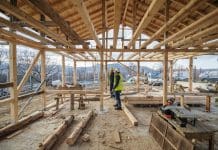Dr Tim Fox, Fellow of the Institution of Mechanical Engineers argues that a solution to the UK’s housing crisis could lie in the off-site construction sector
The UK’s housing supply market is widely-recognised as being broken, and fixing it will require bold long-term leadership from government to incentivise innovation, set challenging standards and put the householder at the heart of the build process.
As the nation continues to grow in both population numbers and prosperity, an estimated 250,000 new homes are going to need to be built each year in England alone for the next 15 years at least. The problem is, in reality the number actually being provided is on average more than 100,000 less than this annually.
With demand typically exceeding supply by a substantial margin for the past few decades, UK house prices have tended to increase at rates far outstripping retail inflation and wage growth, leading to a long-term reduction in housing affordability.
While rising house prices are popular with some, they clearly have various detrimental effects on many more, including on social mobility, the labour market, debt burdens, homelessness, welfare expenditure and pension provisions. In parallel, high land prices, and a problematic planning regime, ensure that the current house building market provides high returns for land owners, marginal returns for builders, and almost completely ignores the long-term needs of the homes’ ultimate owners and occupiers.
The new Conservative government needs to demonstrate real ambition, leadership and innovation, not make small piecemeal changes, if it is going to solve the UK’s housing crisis. Overhauling the way the UK constructs homes could be the quickest and most effective way of achieving this.
Off-site construction technologies have advanced greatly in recent years and can offer shorter build times, better quality, better energy efficiency, less waste and lower costs for buyers. This method offers a wide range of advantages over conventional forms.
These include:
- Shorter build times, typically less than half the time it takes to build a conventional, masonry house;
- Superior quality, through factory-based quality control, precision engineering and design standardisation;
- More energy-efficient, achieving superior thermal insulation, with in-use energy savings of at least 20% over conventional methods;
- Less waste, through efficient use of materials, up to 90% less waste than conventional construction sites;
- Lower ownership costs, through lower bills and reduced maintenance;
- Upskilling and strengthening UK manufacturing, through high-technology manufacturing and opening up of new supply chain opportunities as well as export potential;
- Reduced impact on transport systems, pollution and infrastructure, where off-site construction will reduce the amount of raw materials needed to be transported to the site.
Historically, the only previous large-scale deployment of off-site techniques for houses (as opposed to flats or commercial properties) in the UK was the programme of prefabricated (prefab) building immediately after the Second World War. These units were designed as a temporary solution to an acute housing need in an era of severe construction material and labour shortages. In today’s context, the most significant support for the increased use of off-site construction methods rests with the government’s ambition to raise the requirements for the thermal performance of new homes, as well as meet the as-yet unsatisfied and increasing demand for more dwellings. Done properly, such ambitions can make off-site techniques cost-competitive for volume house builders and speed up the supply side of the equation.
The current off-site industry needs support for innovation and expansion and needs the people and facilities to compete against imports, if it is to meet the demand for its products that could come from empowering clients focused on long-term quality and value. Government should help develop the skills and infrastructure required to grow this sector, which will not only help repair the UK’s broken housing supply market, but create jobs and deliver economic benefit for the nation.
One area that has the potential to substantially increase the quality and sustainability of UK homes, and that would benefit significantly from support of an off-site industry, is that of the self-build sector.
Most new-build homes are for individual private purchasers, but those ultimate purchasers have little to no influence over the quality, size or design of their home, other than through deciding whether or not to buy it. This disconnect simply does not exist in other sectors, but, crucially, does not apply to self-builders where achieving higher quality, better cost-in-use and innovation in sustainability more often apply. The Institution of Mechanical Engineers believes the UK government should, as part of a comprehensive housing market reform programme, aim to grow the self-build sector, supported by UKbased off-site manufacturers, to supply at least 50% of the market need (125,000 homes a year in England) by 2030. Such a move could help reverse the negative impacts on the sustainability of new homes in the UK resulting from the government’s lack of commitment to the Code for Sustainable Homes and other similar initiatives.
People living in the UK deserve affordable quality homes and it is about time that consumers had more say on the quality, design and size of their homes. Self-build is one more very effective route to achieving this. By 2020, there should be at least as many houses built by these players as are constructed by the traditional commercial building companies (125,000 a year in England). By 2030, self-builders alone should be achieving this annual level of completion. Government should recognise that the step change in ambition required, needs far more commitment and imagination than the welcome, but inadequate, £30m for self-build schemes announced in 2011; the need is for a fundamental restructuring of supply and there is an opportunity to lead the way.
Dr Tim Fox
Fellow
Institution of Mechanical Engineers
Twitter: @IMechE
















